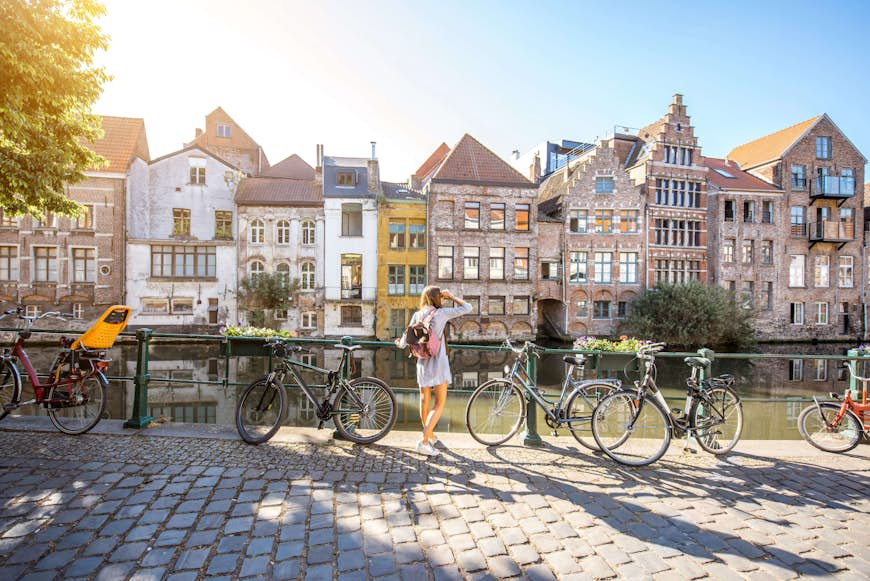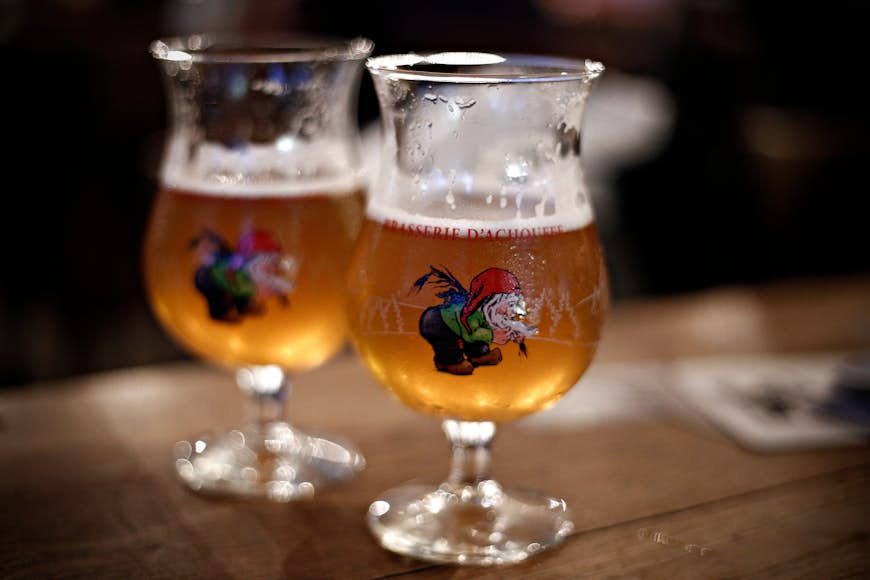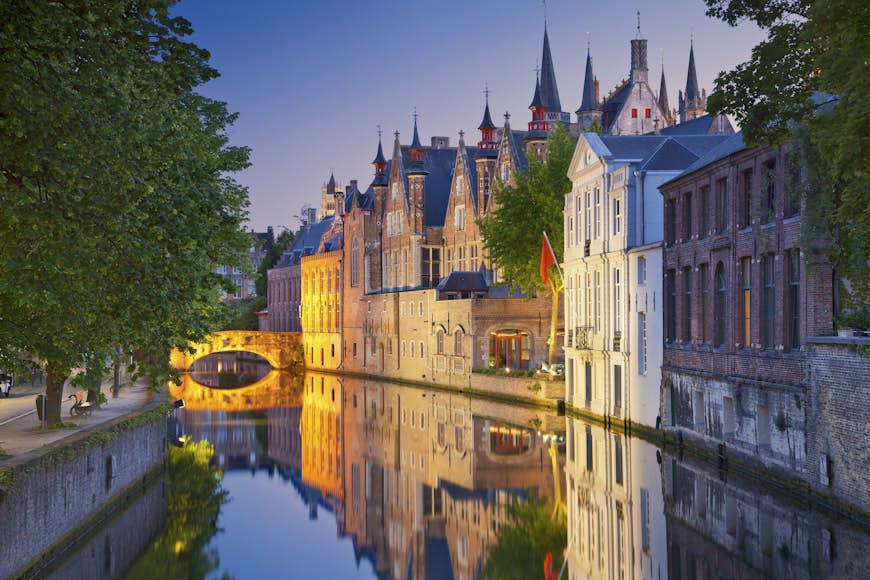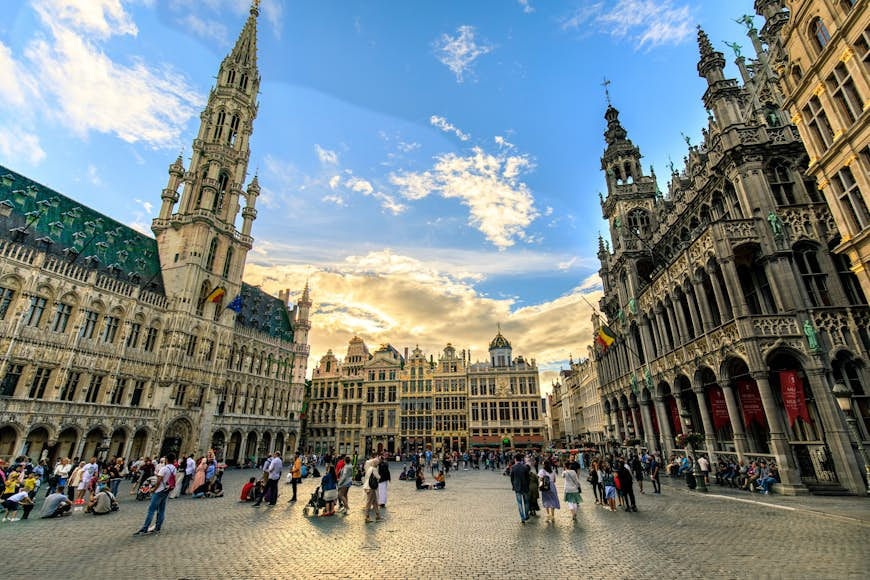Despite being one of the smallest countries in Europe, Belgium has a lot to offer travelers – medieval castles, modern architecture, a world-renowned fashion scene, great food, and more than 1000 brands of beer – really!
Belgium also has not one, but three official languages. Luckily, more than half of Belgians speak English, so it’s easy to get around – just be aware of the monolingual road signage (the language will depend on where in Belgium you are). Here are our top tips to help you make the most of a trip to Belgium.
Planning your trip to Belgium
Pack a raincoat
Influenced by the weather systems of the North Sea and the Atlantic Ocean, Belgium has a temperate maritime climate, characterized by frequent precipitation and heavy cloud cover. The temperature rarely climbs above 22°C (72°F) in the summer, and thunderstorms are frequent – so you’ll want to pack rain gear, regardless of what time of year you visit.
Make the most of your trip by traveling around
There’s so much to see in Belgium and it’s easy to travel from one place to the next by car or train, so we recommend splitting your time between several destinations. Get lost in the atmospheric streets of Bruges, hit the museums and fashion boutiques in Antwerp, lace up your hiking boots in Hoge Kempen National Park – the country’s only national park – and visit the UNESCO World Heritage-listed Grand Place in Brussels. Most cities are within a few hours of one another, making it easy to cover a lot of ground in a short period of time.
Bring pocket change in case you need to spend a penny
In Belgium, free public restrooms are virtually non-existent. Most public facilities charge and few accept credit cards, so you’ll want to carry loose some euros and cents in change. Expect to pay around €0.50 (US$0.54) per visit – get into the habit of using the washroom before leaving the hotel or restaurant.
Swap taxis for public transport when you arrive in Brussels
Taxis in Brussels are among the most expensive in Europe – a cab ride between Brussels Airport and the city center will cost at least €3 (US$3.30) per km. While we won’t judge for splurging after a long-haul flight, the city’s excellent bus, tram and metro system will take you almost anywhere you need to go from 6am to midnight, seven days a week, including into town from the airport (for as little as €7/US$7.35 in total). For cheap, low-carbon transport, consider renting a bike through one of the many local bike-sharing platforms, such as Villo! and Billy Bike.
Don’t rush to rent a car
Belgium is car-friendly in a lot of ways – you can drive from one end of the country to the other in a matter of hours, and nearly all the country’s motorways are fully lit at night. It’s also super easy to rent a car on the fly, thanks to car-sharing apps such as Poppy and Cambio.
At the same time, driving in Belgium can be quite an undertaking. Signage is mostly monolingual, and the names of places depend on which language is being spoken. For example, the German border city of Aachen might appear on Belgian signs as Aix-la-Chapelle, the Flemish city of Ghent is also Gand, and Liège is also Lîdje, Luik and Lüttich.
When in doubt, speak English
Belgium has three official languages: Dutch, French and German. Dutch (specifically, the Flemish dialect) is primarily spoken in Flanders in the north, while French is mostly spoken in the southern region of Wallonia, and German is the default in eastern regions of the province of Liège. Brussels (also known as Brussel and Bruxelles) is officially bilingual, speaking Dutch and French.
With language at the center of Belgium’s knotty cultural identity debate, it’s best to speak English if you’re unsure of the dominant tongue wherever you happen to be. You’ll likely find that most people, especially in big cities such as Antwerp and Brussels, speak flawless English anyway.

Etiquette in Belgium
Recycle like a Belgian
Belgians take recycling very seriously. In fact, the country boasts the highest recycling rate for household packaging in all of Europe (an impressive 94.9%). While you should always take care to recycle and reduce when you’re on the road away from home, you’ll want to be especially mindful of this when you’re traveling through Belgium.
There’s no need to tip in Belgium
Tipping in Belgium isn’t a standard practice, nor is it expected, as most service staff are paid a fair living wage. Furthermore, a 10–15% tip is automatically included in the bill at most restaurants. If you think the service was great and you want to leave more, you can always leave a few euros on the table after your meal.
Extend a hand in greeting
How do you greet people in Belgium? It depends where you are. Most people in Brussels prefer a handshake, while the majority of folks in French-speaking Wallonia will turn a cheek for a kiss. To play it safe in these Covid-aware times, we recommend extending a hand to test the waters.
Don’t leave your shopping for Sunday
If you need to stock up at the supermarket or buy souvenirs, don’t plan on doing it on a Sunday. As most Belgians are Roman Catholic, many shops are closed on Sundays, including major grocery stores and banks.

Drink beer, lots of lovely beer
Belgium is home to over 300 breweries and there are more than 1000 types of Belgian beer. So, it’s practically a requirement to imbibe while you’re there (and honestly, you might be judged if you order a glass of vino instead of a homegrown brew at the local pub). Try everything from pilsners and witbier to Trappist ales and naturally fermented lambics.
Oh, and don’t expect to chug your Duvel out of any old glass. Belgians love their glassware, and you’ll find a dizzying array of options, from tulips and flutes to goblets and tankards.
Smoke pot if you like (but be smart about it)
In Belgium, adults 18 and older can enjoy cannabis for recreational purposes. Possession is decriminalized and it’s legal to possess up to 3 grams of cannabis, so long as no “public nuisance” is caused. However, don’t expect to find cannabis-serving ‘coffee shops’ of the kind found in the Netherlands; Belgium is not nearly as pot-friendly as its northern neighbor, so puff discretely.

Health and safety in Belgium
Can you drink the tap water in Belgium?
Yes, you certainly can. Some even say the tap water is even better than the bottled mineral kind you get in the supermarket (bring a water bottle to save on plastic).
You can feel safe about being yourself
In 2003, Belgium became the second country in the world to legalize same-sex marriage, and the country’s long-held progressive values and vibrant nightlife make it a top destination for LGBTIQ+ travelers. Brussels has long been the center of the scene – the city’s La Demence event draws partiers from all over the world, 12 times a year – but even smaller towns such as Bruges and Ghent are getting in on the action.
Have fun – but be cautious of petty crime
Generally speaking, Belgium is a safe country, with relatively low rates of crime. For most travelers, the biggest risk is pickpocketing and bag-snatching in crowded areas. However, in recent years, there has been a rise in terrorist attacks across Belgium – travelers should exercise vigilance, particularly in Brussels, where international organizations including NATO and the EU are headquartered.
